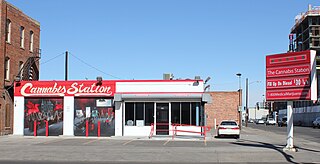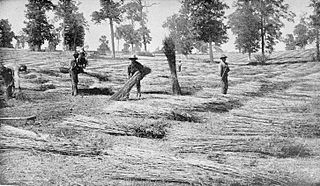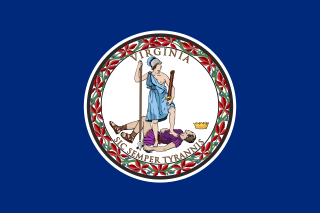
The legality of cannabis for medical and recreational use varies by country, in terms of its possession, distribution, and cultivation, and how it can be consumed and what medical conditions it can be used for. These policies in most countries are regulated by the United Nations Single Convention on Narcotic Drugs that was ratified in 1961, along with the 1971 Convention on Psychotropic Substances and the 1988 Convention against Illicit Traffic in Narcotic Drugs and Psychotropic Substances.

A head shop is a retail outlet specializing in paraphernalia used for consumption of cannabis and tobacco and items related to cannabis culture and related countercultures. They emerged from the hippie counterculture in the late 1960s, and at that time many of them had close ties to the anti-Vietnam War movement as well as groups in the marijuana legalization movement like LeMar, Amorphia, and the National Organization for the Reform of Marijuana Laws.
The Commission of Inquiry into the Non-Medical Use of Drugs, often referred to as the Le Dain Commission after its chair Dean Gerald Le Dain, was a Canadian government commission that was begun in 1969 and completed its work in 1972.

Created in 1983, the Campaign Against Marijuana Planting (CAMP) was a multi-agency law enforcement task force managed by the California Bureau of Narcotic Enforcement and composed of local, state and federal agencies organized expressly to eradicate illegal cannabis cultivation and trafficking in California. With more than 110 agencies having participated, CAMP was the largest law enforcement task force in the United States.
Amendment 44 was a proposed amendment to the state statutes submitted for referendum in the 2006 general elections in the U.S. state of Colorado. The amendment proposed the legalization of the possession of one ounce or less of marijuana for any person twenty-one years of age and over, as long as marijuana use does not occur in public. The measure was eventually defeated at the polls by 60-40 percent.

In the United States, the non-medical use of cannabis is decriminalized in 14 states, and legalized in another 10 states, as of April 2019. Decriminalization refers to a policy of reduced penalties for cannabis offenses, typically involving a civil penalty for possession of small amounts, instead of criminal prosecution or the threat of arrest. In jurisdictions without any penalties the policy is referred to as legalization, although the term decriminalization is sometimes broadly used for this purpose as well.
Drug liberalization is the process of eliminating or reducing drug prohibition laws. Variations of drug liberalization include: drug legalization, drug relegalization and drug decriminalization. Whilst many people would argue that decriminalization will only cause an increase in usage, studies from California and Colorado, two states that implemented the policy, found that "decriminalization" of marijuana possession had little or no impact on rates of use, and found that it was effective in reducing drug usage due to better control." Drug liberalization may go hand in hand with or include measures to ensure responsible drug use and some state that its challenge is not in criticizing prohibition, but in designing something better.

The use, sale, and possession of cannabis over 0.3% THC in the United States is illegal under federal law. As a Schedule I drug under the federal Controlled Substances Act of 1970, cannabis over 0.3% THC is considered to have "no accepted medical use" and have a high potential for abuse and physical or psychological dependence. Cannabis use is illegal for any reason, with the exception of FDA-approved research programs. However, individual states have enacted legislation permitting exemptions for various uses, mainly for medical and industrial use but also including recreational use.

Cannabis in Oregon relates to a number of legislative, legal, and cultural events surrounding use of cannabis. Oregon was the first U.S. state to decriminalize the possession of small amounts of cannabis, and among the first to authorize its use for medical purposes. An attempt to recriminalize possession of small amounts of cannabis was turned down by Oregon voters in 1997.

The Marijuana Control, Regulation, and Education Act, also known as California Assembly Bill 390 and later Assembly Bill 2254, is the first bill ever introduced to regulate the sale and use of marijuana in the U.S. state of California. If passed and signed into law, marijuana would be sold and taxed openly to adults age 21 and older in California. Tom Ammiano, a Democrat representing California's 13th State Assembly district, introduced this piece of legislation on February 23, 2009, arguing that the bill will "tax and regulate marijuana in a manner similar to alcohol." As introduced, this proposal is estimated to raise over $1 billion in annual revenue by taxing the retail production and sale of marijuana for adults 21 years of age and older. To obtain a commercial grow license one would pay an initial $5,000 fee, then a $2,500 fee each year after that. A tariff of $50 per ounce would also be placed on all sold and grown marijuana. The bill has gained much media attention, statewide and nationally.

In the United States, the use of cannabis for medical purposes is legal in 33 states, four permanently inhabited U.S. territories, and the District of Columbia, as of January 2019. Fourteen other states have more restrictive laws limiting THC content, for the purpose of allowing access to products that are rich in cannabidiol (CBD), a non-psychoactive component of cannabis. There is considerable variation in medical cannabis laws from state to state, including how it is produced and distributed, how it can be consumed, and what medical conditions it can be used for.

Cannabis in California is legal for both medical and recreational use. In recent decades, the state has been at the forefront of efforts to reform cannabis laws, beginning in 1972 with the nation's first ballot initiative attempting to legalize cannabis. Although Proposition 19 was unsuccessful, California would later become the first state to legalize medical cannabis with the passage of the Compassionate Use Act of 1996. In November 2016, California voters approved the Adult Use of Marijuana Act to legalize the recreational use of cannabis.

Cannabis in Colorado refers to cannabis use and possession in the state of Colorado. The Colorado Amendment 64, which was passed by voters on November 6, 2012, led to legalization in January 2014. The policy has led to cannabis tourism. There are two sets of policies in Colorado relating to cannabis use: those for medicinal cannabis and for recreational drug use along with a third set of rules governing hemp.

Cannabis in Massachusetts relates to the legal and cultural events surrounding the use of cannabis. A century after becoming the first U.S. state to criminalize recreational cannabis, Massachusetts voters elected to legalize it in 2016.
Cannabis in Guam has been legal for medical purposes since 2015 and legal for recreational purposes since April 2019. Guam was the first United States Territory to legalize medical marijuana, passing via a ballot referendum in 2014.

Cannabis is illegal for use as a drug in Kentucky, United States, though non-psychoactive CBD oil is legal in the state, and Kentucky has a lengthy history of cultivating industrial hemp for fiber since 1775.

Cannabis in Washington relates to a number of legislative, legal, and cultural events surrounding the use of cannabis. On December 6, 2012, Washington became the first U.S. state to legalize recreational use of marijuana. The state had previously legalized medical marijuana in 1998. Under state law, cannabis is legal for medical purposes and for any purpose by adults over 21.

Cannabis in the Czech Republic is illegal for recreational use, but personal possession has been decriminalized since 1 January 2010 and medical cannabis has been legal since 1 April 2013.
Cannabis in Georgia is legal in terms of its possession and consumption due to a ruling by the Constitutional Court of Georgia on 30 July 2018. Cultivation and sale of cannabis remains illegal.

The Cannabis Act (C-45) of June, 2018, paved the way to the legalization of cannabis in Canada on October 17, 2018. Police and prosecution services in all Canadian jurisdictions are currently capable of pursuing criminal charges for cannabis marketing without a licence issued by Health Canada. The Supreme Court of Canada has held that the federal Parliament has the power to criminalise the possession of cannabis and that doing so does not infringe the Canadian Charter of Rights and Freedoms. The Ontario Court of Appeal and the Superior Court of Ontario have, however, held that the absence of a statutory provision for medical marijuana is unconstitutional, and to that extent the federal law is of no force and/or effect if a prescription is obtained. The recreational use of cannabis has been legalized by the federal government, and took effect on October 17, 2018.

















